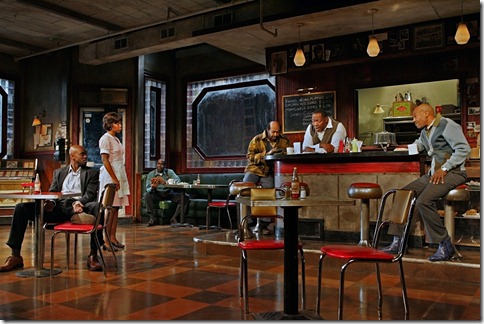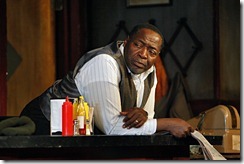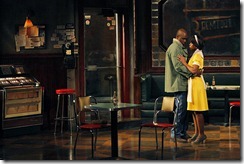 Acknowledged as America's foremost African American playwright, August Wilson writes plays that chronicle life in Pittsburgh's mostly black Hill District in the last half of the 20th century. But while this subject matter appears to be narrow, the themes he addresses are universal and place him right up there in the dramatic pantheon with Tennessee Williams and Arthur Miller.
Acknowledged as America's foremost African American playwright, August Wilson writes plays that chronicle life in Pittsburgh's mostly black Hill District in the last half of the 20th century. But while this subject matter appears to be narrow, the themes he addresses are universal and place him right up there in the dramatic pantheon with Tennessee Williams and Arthur Miller.
To prove that point, one only has to see Two River Theater Company's current production of Wilson's Two Trains Running, directed once again by Ruben Santiago-Hudson (who directed Jitney last spring for the theater). This not-to-be-missed, engrossing and poignant production opened last weekend and has already extended its run to March 3!
This time, the theme of the play is justice. The time is 1969, after the Civil Rights Act has been passed, Martin Luther King, Jr., has been assassinated (as has Robert F. Kennedy) and the Black Power movement is in ascendance. The Hill district's black businesses are facing urban renewal, which means that the city of Pittsburgh can take their properties by right of eminent domain, and even though the city is supposed to pay the owners a fair rate, that number usually doesn't jibe with what the proprietors think is just compensation for the loss of their livelihood. That so many characters have suffered injustice at the hands of a white man makes their concerns more particular to race and social mores, perhaps, but through the community of ordinary people who congregate in the dying days of Memphis Lee's luncheonette, August Wilson reminds us that when individual people find personal freedom and equality, they can attain the justice they feel they are owed.
For many these characters, the measure of justice lies in money. Just released from the penitentiary, Sterling seeks a job so he can buy a Cadillac. Holloway's guru, the seer Aunt Ester, will help people get what they wish for if they throw a $20 bill into the Monongehela River. Numbers runner Wolf takes bets from the others in hopes of a big pay-off for them and a little from his "bosses" for himself. And, rejecting cash offers of up to $15,000 from the undertaker West (the only really successful business on the block) luncheonette owner Memphis announces that he will accept no less than $25,000 from the city from his place. But it is the mentally ill Hambone who seeks the real justice: a ham promised him over nine years before by the white owner of Lutz's Meat Market for his painting a fence. It seems that when he finished, Lutz offered him a chicken, leading the man to ask for his ham every day since then in an effort to see that justice is served.
Most of the magnificent cast that Santiago-Hudson has assembled for this production are veterans of Wilson plays; in fact, five appeared in last year's Jitney, and several originated roles in Two Trains Running. Their ensemble efforts make the characters' relationships feel convincing and natural, like a real neighborhood, one that will be lost to urban renewal.
 Dominating the events is Chuck Cooper as a majestic, dignified Memphis (left). He is a man who, when cheated out of a farm he purchased 38 years before by a white man, traveled north and founded a business that for years was a crowded busy place. With the money he hopes to get from the city, he plans to return to Jackson, Mississippi, and reclaim his land. Holloway, played by James A. Williams, is the avuncular raconteur of the lot, spinning tales of 323-year-old Aunt Ester, offering a diatribe on slavery, among other comments about the lot of black people. And John Earl Jelks is the smooth, nattily-dressed Wolf, running numbers and making payoffs (and a pass at the waitress Risa). His account of his relationships with his various women are quite droll.
Dominating the events is Chuck Cooper as a majestic, dignified Memphis (left). He is a man who, when cheated out of a farm he purchased 38 years before by a white man, traveled north and founded a business that for years was a crowded busy place. With the money he hopes to get from the city, he plans to return to Jackson, Mississippi, and reclaim his land. Holloway, played by James A. Williams, is the avuncular raconteur of the lot, spinning tales of 323-year-old Aunt Ester, offering a diatribe on slavery, among other comments about the lot of black people. And John Earl Jelks is the smooth, nattily-dressed Wolf, running numbers and making payoffs (and a pass at the waitress Risa). His account of his relationships with his various women are quite droll.
 The young people are represented by Roslyn Ruff as Risa and Owiso Odera as Sterling. Ruff's Risa is morose and listless; she has cut her legs to make her ugly to others so she doesn't have to become involved with anyone. She does, however, feel sad about the death of the Prophet Samuel, a Father Divine-like character whose wake goes on for days so people can touch his head for good fortune, and the free food and warm jacket she gives Hambone shows that she really can care for someone. As Sterling (who, Memphis predicts, will be dead or back in prison within three days) Odera is charming and sinuous as he slides around the luncheonette's checkerboard floor spinning tales of the success he hopes to attain. There is a touching scene between him and Risa late in the second act when the two reach out to each other, and his unselfish act at the end of the play is the mark of true justice and compassion.
The young people are represented by Roslyn Ruff as Risa and Owiso Odera as Sterling. Ruff's Risa is morose and listless; she has cut her legs to make her ugly to others so she doesn't have to become involved with anyone. She does, however, feel sad about the death of the Prophet Samuel, a Father Divine-like character whose wake goes on for days so people can touch his head for good fortune, and the free food and warm jacket she gives Hambone shows that she really can care for someone. As Sterling (who, Memphis predicts, will be dead or back in prison within three days) Odera is charming and sinuous as he slides around the luncheonette's checkerboard floor spinning tales of the success he hopes to attain. There is a touching scene between him and Risa late in the second act when the two reach out to each other, and his unselfish act at the end of the play is the mark of true justice and compassion.
In the role of Hambone, Anthony Chisholm doesn't have much more to do than shout, "Give me my ham!" but instead of being annoying to the audience, the futility that the man exudes is heartbreaking. And rounding out the cast is Harvy Blanks as the successful and pompous undertaker West, whose attempts to buy up the entire block cheap and resell it to the city for an exorbitant amount make him a distasteful character; he's so good that we subconsciously admire him even as we dislike him!
Set designer Michael Carnahan gives us a veritable 1960's luncheonette, complete with swiveling counter stools, checkered linoleum floor, booths and a juke box. Xavier Pierce's lighting and Robert Kaplowitz's sound complete the effect, as does original music by Bill Sims, Jr. And Karen Perry's costumes nail each character on the nose. We can tell the passage of time by Risa's change in waitress uniforms; Wolf's leather jackets and pants mark him as a snappy dresser; Sterling's casual attire is appropriate to a young thirty-something of the period; and West's all-black costume—complete with black gloves and homburg—telegraphs his success.
August Wilson has said, “I'm trying to take culture and put it onstage, demonstrate it is capable of sustaining you....My plays are about love, honor, duty, betrayal—things humans have written about since the beginning of time.” Two Trains Running is about all that and more: personal freedom, equality, justice and, above all, hope. Two River's magnificent production reminds us of what we lost in the passing of August Wilson and just how important is legacy he left us with the Pittsburgh Cycle of plays. Don't miss this powerful, funny, compassionate play; your own life will be better for your having seen it.
Two Trains Running will be performed at the Two River Theater’s Rechnitz Theater, 21 Bridge Avenue, Red Bank, through March 3. Rickets are available from 732.345.1400 or www.trtc.org.